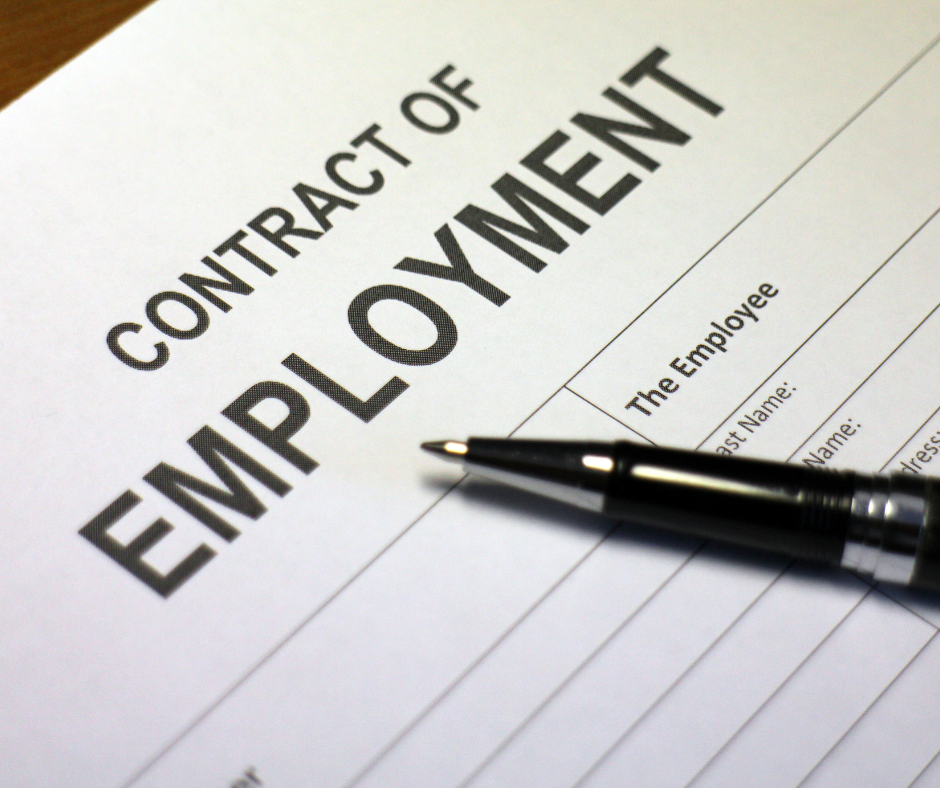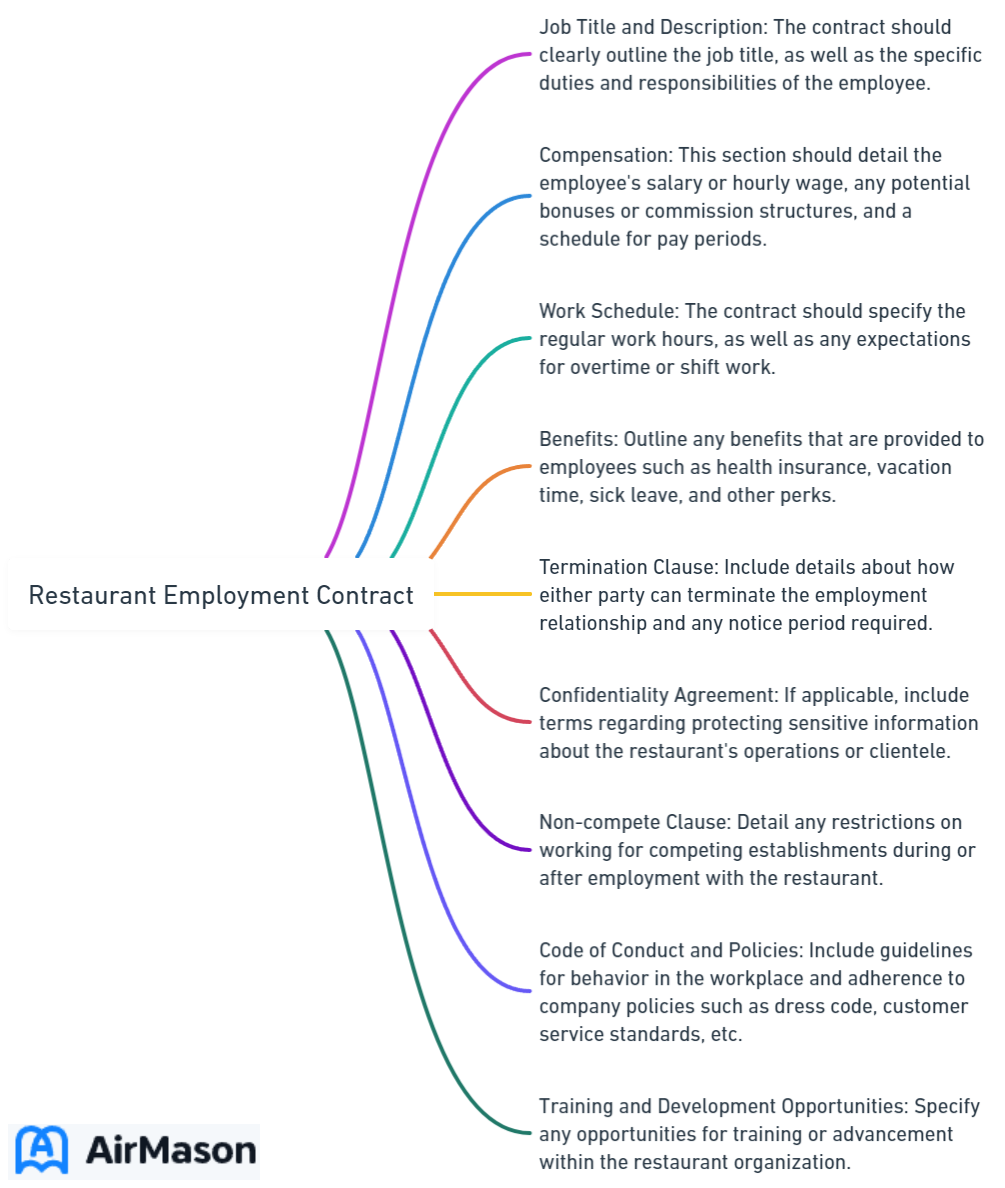
A restaurant employment contract is a legally binding document that outlines the terms of employment between a restaurant employer and an employee. It sets forth the rights and responsibilities of both parties and helps establish a clear understanding of the employment arrangement. A study conducted by the National Restaurant Association found that having a well-drafted employment contract in place can bring numerous benefits for both employers and employees in the restaurant industry.
Importance and Benefits of Restaurant Employment Contracts:
- Clarifies Job Responsibilities and Expectations: A restaurant employment contract clearly defines the specific duties and responsibilities of the employee, ensuring that both parties are on the same page regarding job expectations.
- Establishes Compensation and Benefits: The contract includes details about the employee’s compensation, such as wages, bonuses, and other benefits, safeguarding the employee’s right to fair and proper payment.
- Protects the Rights of Both Parties: By specifying the rights and obligations of both the employer and the employee, the contract provides a legal framework for dispute resolution and protects the interests of both parties.
- Ensures Compliance with Labor Laws: A well-drafted employment contract helps ensure that the restaurant is in compliance with relevant labor laws and regulations, thereby minimizing legal risks and potential disputes.
Key Elements of a Restaurant Employment Contract:
- Job
- Working Hours and Schedule: Specifies the expected working hours, days off, and any rotating or irregular schedules.
- Compensation and Benefits: Outlines the employee’s wages, bonuses, benefits, and any applicable overtime or holiday pay.
- Terms of Employment: Details the duration of employment, whether it is a fixed-term or indefinite contract.
- Termination and Resignation: Includes provisions on termination conditions, notice periods, and procedures for resignation.
- Employee pledge of commitment.
Legal Considerations in Restaurant Employment Contracts:
- Minimum Wage and Overtime: Ensures compliance with minimum wage laws and addresses overtime compensation for eligible employees.
- Non-Disclosure and Non-Compete Clauses: Protects the restaurant’s confidential information and prevents employees from working for competitors during or after employment.
- Intellectual Property Rights: Outlines ownership and usage rights of intellectual property created during employment, such as recipes or branding materials.
- Confidentiality and Non-Disclosure: Requires employees to maintain the confidentiality of proprietary information and trade secrets.
Ensuring Fair and Equitable Employment Contracts in Restaurants:
- Seek Legal Advice: Consult with an employment lawyer to ensure that the contract is in compliance with local labor laws and regulations.
- Clearly Communicate with Employees: Maintain open and transparent communication with employees about the terms of their employment contracts.
- Regularly Review and Update Contracts: Stay up to date with industry changes and periodically review and update employment contracts as necessary.
- Prioritize Employee Rights and Fair Treatment: Ensure that the terms and conditions of the employment contract prioritize fair treatment, respect, and the protection of employee rights.
By having well-structured and legally sound employment contracts, restaurants can establish a positive and professional work environment while protecting the interests of both the employer and the employees.

What is a Restaurant Employment Contract?
A restaurant employment contract, also known as a restaurant job agreement, is a legally binding document that delineates the terms and conditions of employment within a restaurant setting. It serves to establish clear communication between the restaurant establishment and its employees, defining their respective rights and responsibilities. The comprehensive contract covers various aspects of employment, including but not limited to:
1. Job Position and Duties: The agreement explicitly specifies the employee’s designated position, assigned duties, working hours, shifts, and any specific tasks they are expected to complete. This section should also include the employee dress code if any.
2. Compensation: The contract provides detailed information regarding the employee’s remuneration, including their wage or salary, the frequency and method of payment, and also encompasses additional benefits such as tips or bonuses.
3. Duration of Employment: It distinctly outlines whether the employment period is for a fixed term or an indefinite one. In addition, it encompasses termination provisions, notice periods, and the conditions under which the employment can be terminated.
4. Employee Benefits: The contract may elaborate on the benefits provided to the employee by the restaurant, including but not limited to health insurance coverage, paid time off, retirement plans, and other perks unique to the establishment.
5. Confidentiality and Non-Compete Clauses: To protect the restaurant’s proprietary information, the contract may incorporate clauses that restrict employees from disclosing confidential information and prohibit them from engaging in competitive employment during or after their tenure.
6. Dispute Resolution: The contract incorporates a specific mechanism for resolving conflicts, either through mediation or arbitration, aiming to preemptively address any future disputes that may arise.
Both the restaurant and the employee are strongly advised to meticulously review and comprehend the terms stipulated within the contract before affixing their signatures. Such diligent scrutiny ensures that all parties involved have a clear understanding of their rights and obligations, thereby minimizing the occurrence of misunderstandings or disagreements in the future.

Importance and Benefits of Restaurant Employment Contracts
Restaurant employment contracts play a crucial role in ensuring clarity, fairness, and protection for both employers and employees. Discover how these contracts clarify job responsibilities, establish compensation and benefits, protect rights, and ensure compliance with labor laws. From defining roles and expectations to safeguarding legal rights, restaurant employment contracts are vital for a thriving and harmonious workplace. Let’s dive into the importance and numerous benefits these agreements offer in the restaurant industry.
1. Clarifies Job Responsibilities and Expectations
When it comes to restaurant employment contracts, it is crucial to clarify job responsibilities and expectations. This ensures that both the employer and employee are on the same page regarding the specific role and responsibilities. Here are some key points to consider in order to achieve this clarity:
- Clearly state the job title and description: This helps to establish a clear understanding of the specific role and responsibilities.
- Outline working hours and schedule: By specifying the expected working hours, including any overtime requirements or shift rotations, confusion can be avoided.
- Establish compensation and benefits: It is important to clearly define the salary or hourly rate, as well as any additional benefits such as healthcare, vacation time, or bonuses.
- Define terms of employment: Specify the duration of the contract, whether it’s temporary, part-time, or full-time, and any probationary periods.
- Include termination and resignation clauses: By clearly stating the conditions for contract termination and the required notice period, both parties can be prepared.
By incorporating these elements into a restaurant employment contract, job responsibilities and expectations can be effectively clarified. This not only helps to create a positive work environment but also improves communication and fosters a sense of accountability. A very good practice will be to add these in the employee handbook as well because we have seen it in a lot of employee handbook examples that we have reviewed overtime.
In the past, employment contracts in the restaurant industry were often ambiguous, leading to confusion and disputes. However, with the advancement of labor laws and increased awareness of employee rights, the need for clear employment contracts that clarify job responsibilities and expectations became evident. Today, restaurant owners and employees alike understand the importance of well-drafted employment contracts that create a transparent and harmonious working environment.
2. Establishes Compensation and Benefits
When establishing compensation and benefits in a restaurant employment contract, consider the following:
1. Clearly outline the employee’s salary or hourly wage for transparency and to avoid misunderstandings.
2. Specify any additional benefits provided by the employer, such as health insurance, retirement plans, or paid time off. These benefits contribute to the overall compensation package.
3. Include provisions for performance-based bonuses or incentives to motivate employees and reward hard work.
4. Address potential paycheck deductions, such as taxes or uniform expenses, transparently to avoid disputes.
5. Outline the frequency of pay (weekly, bi-weekly, or monthly) so employees know when to expect wages.
6. Ensure compliance with applicable laws regarding minimum wage and overtime to guarantee fair compensation.
7. Include provisions for salary increases or adjustments over time to allow for growth within the employee’s role.
Establishing clear compensation and benefits in a restaurant employment contract establishes the compensation and benefits offered by the employer. This fosters mutual understanding and ensures fair treatment for both employers and employees.
3. Protects the Rights of Both Parties
Restaurant employment contracts play a vital role in safeguarding the rights of both parties involved in multiple ways:
1. Defining job responsibilities and expectations: These contracts explicitly outline the employee’s duties and responsibilities, establishing a solid framework for their work.
2. Establishing fair compensation and benefits: Within the contract, all the details regarding the employee’s wages, bonuses, and benefits are clearly stated to prevent any misunderstandings or disputes.
3. Ensuring adherence to labor laws: Restaurant employment contracts strictly adhere to labor laws and regulations, including provisions for working hours, breaks, overtime, and other employment standards.
4. Providing protection against unjust treatment: These contracts also safeguard employee rights, specifically protecting them against discrimination or harassment. Additionally, they establish a transparent process for resolving any conflicts or disputes that may arise.
It is a well-established fact that employment contracts have the potential to reduce turnover rates and enhance employee satisfaction. Research demonstrates that clearly defining expectations and terms of employment contributes significantly to fostering a positive work environment and fostering employee retention.
4. Ensures Compliance with Labor Laws
Ensuring compliance with labor laws is crucial for restaurant employment contracts to protect the rights of employers and employees. Here are the key points to consider:
1. Minimum wage and overtime: The contract should specify the minimum wage and rules for overtime pay.
2. Non-disclosure and non-compete clauses: Include these clauses to protect the restaurant’s confidential information and restrict employees from working for competitors.
3. Intellectual property rights: Address ownership and usage rights for original creations by employees.
4. Confidentiality and non-disclosure: Emphasize the importance of maintaining confidentiality about the restaurant’s operations and proprietary information.
By including these aspects in a restaurant employment contract, both employers and employees can ensure labor law compliance and protect their rights. Implementing these measures ensures compliance with labor laws.

Key Elements of a Restaurant Employment Contract
When it comes to a restaurant employment contract, there are several key elements that both employers and employees need to be aware of. From the job title and description to working hours, compensation, and the terms of employment, each aspect plays a crucial role. In this section, we will explore the important details regarding these elements, including the significance of each subsection such as job responsibilities, working hours, compensation packages, and the termination process. So, let’s dive in and unravel the essentials of a restaurant employment contract!
1. Job Title and Description
Job
| Job | Description |
| Server | The Server job entails serving food and beverages to customers, taking orders, ensuring customer satisfaction, handling cash transactions, maintaining work area cleanliness, and assisting other staff. |
| Chef | The Chef role involves the preparation and cooking of food according to restaurant recipes and standards. It requires ensuring proper food handling and storage while collaborating with other kitchen staff to maintain a smooth workflow and deliver high-quality dishes. |
| Bartender | A Bartender mixes and serves both alcoholic and non-alcoholic beverages to customers. They take orders, interact with customers, and provide recommendations while keeping the bar area clean and organized. |
| Host/Hostess | A Host/Hostess greets and seats customers, manages reservations, and maintains a welcoming atmosphere. They answer phone calls and provide information about the restaurant, while also coordinating with servers and kitchen staff for smooth operations. |
Clear job descriptions in restaurant employment contracts are crucial for both employers and employees. They define roles and responsibilities, ensuring mutual understanding and effective performance.
For instance, the job title “Server” indicates serving food and beverages, taking orders, handling cash transactions, and maintaining cleanliness. Conversely, the job title “Chef” involves food preparation, cooking, ensuring food safety, and collaborating with kitchen staff.
Accurate and detailed job descriptions help employees understand their roles, enabling employers to assign tasks, evaluate performance, and provide appropriate training and guidance.
To maintain fair and equitable employment contracts, employers should regularly review and update them, communicate clearly, seek legal advice when necessary, and prioritize employee rights and fair treatment.
2. Working Hours and Schedule
The working hours and schedule are crucial factors to consider in restaurant employment contracts. Here are some key points to keep in mind:
- Clearly defined working hours: The contract should specify the employee’s expected hours, including start and end times, and required breaks.
- Flexible scheduling: Schedules in the restaurant industry can vary based on business needs. The contract should outline any flexibility in the employee’s schedule, such as different shifts or being on-call.
- Overtime and time off: The contract should clarify how overtime will be handled, including pay rates. It should also cover time off provisions, like vacation days or personal leave.
- Shift swaps and scheduling changes: The contract should address procedures for shift swaps, scheduling changes, and notifying the employer of conflicts.
It is important for employers and employees to have a clear understanding of the working hours and schedule outlined in the contract. This prevents scheduling conflicts and misunderstandings. By clearly defining these details, both parties can create a schedule that meets business needs and considers employee well-being.
Remember, maintaining a fair and balanced working schedule is crucial for employee productivity and well-being in the restaurant industry.
3. Compensation and Benefits
Compensation and Benefits in Restaurant Employment Contracts
When it comes to compensation and benefits in restaurant employment contracts, there are important factors to consider:
- Wage/Salary: The contract clearly states the employee’s wage or salary and payment frequency.
- Tips and Service Charges: The contract outlines the distribution of tips or service charges and tip pooling policies.
- Bonuses and Incentives: The contract specifies criteria for earning additional payments based on performance.
- Benefits: The contract outlines entitlements such as health insurance, retirement plans, vacation leave, and sick leave. It also specifies eligibility conditions.
- Overtime: The contract states how overtime will be compensated, either through higher pay or time off in lieu.
- Meal and Uniform Allowances: The contract addresses provisions for meal allowances and uniform requirements.
A clear understanding of compensation and benefits in the employment contract is important for both employers and employees to avoid future disputes. Employers should ensure compliance with labor laws and industry standards for compensation and benefits.
4. Terms of Employment
The terms of employment in a restaurant contract are essential for both the employer and employee to agree upon. These terms establish a clear understanding and framework for the employment relationship. The contract should specify the duration of employment, whether it is fixed-term or open-ended. It should also clearly state the employee’s job title, description, and specific responsibilities. Additionally, the contract needs to define the agreed-upon working hours, including regular working days and start/end times, as well as any provisions for overtime or shift work. Compensation and benefits should be detailed, including the employee’s salary, additional benefits or allowances, and provisions for bonuses or incentives. It is important to specify the employee’s entitlement to vacation leave, paid holidays, sick leave, and other types of leave.
Furthermore, the contract must include clauses protecting the confidentiality of the restaurant’s proprietary information, trade secrets, and customer data. The conditions under which either party can terminate employment, such as notice periods or severance pay, should also be outlined. To facilitate dispute resolution, the contract may include provisions for mediation or arbitration.
5. Termination and Resignation
Termination and resignation are two crucial aspects of a restaurant employment contract. Here are the key points to consider when it comes to termination and resignation:
- Employees have the option to voluntarily resign from their position. Smooth communication between both parties is essential to ensure a seamless transition and find a suitable replacement.
- The contract should clearly specify the notice period required for resignation. This allows the restaurant to plan ahead and make necessary arrangements for a replacement. The notice period may vary depending on the employee’s level and is typically stated in weeks or months.
- It is important for the contract to outline the grounds for termination, which may include misconduct, poor performance, or violation of company policies. By clearly defining these reasons, it ensures fairness in the treatment of employees.
- In the event of termination without cause, the contract should state whether employees are entitled to receive severance pay. This provides financial support during the transition to new employment.
- The contract should include provisions for employees to return any company property and settle any outstanding dues, such as unpaid wages or benefits. This ensures a well-organized and smooth departure from the restaurant.
By addressing these aspects in the employment contract, both the employer and employee can have a clear understanding and protection in the event of termination or resignation. It promotes fairness, minimizes disputes, and supports a positive working environment.

Legal Considerations in Restaurant Employment Contracts
When it comes to restaurant employment contracts, there are important legal considerations that both employers and employees need to be aware of. In this section, we will dive into the key factors that affect these contracts. From discussing minimum wage and overtime regulations to the inclusion of non-disclosure and non-compete clauses, intellectual property rights, and the importance of confidentiality and non-disclosure agreements, we’ll provide essential insights to ensure both parties are well-protected. Let’s navigate the legal landscape of restaurant employment contracts together.
1. Minimum Wage and Overtime
Minimum wage and overtime are integral components of restaurant employment contracts. It is crucial to address these aspects effectively to ensure the fair treatment of employees.
1. Minimum Wage: It is essential for restaurant employment contracts to clearly state the minimum wage that employees will receive. Employers are legally obligated to pay their staff at least this lowest hourly rate. Complying with local labor laws and regulations in this regard is of utmost importance as failing to do so can lead to legal consequences. For instance, in the United States, the current federal minimum wage is set at $7.25 per hour.
2. Overtime: Overtime refers to any hours worked beyond the regular working hours. Restaurant employment contracts need to outline the criteria for overtime pay, including the applicable rate. In many jurisdictions, employees are entitled to receive one and a half times their regular hourly wage for each hour worked beyond a certain threshold, typically 40 hours per week. This compensates employees for the additional time and effort they dedicate to their work.
To ensure compliance with labor laws and safeguard the rights of both employees and employers, it is crucial for restaurant owners and managers to familiarize themselves with the specific regulations governing minimum wage and overtime in their jurisdiction. Seeking legal advice can assist in drafting contracts that align with these requirements.
By effectively communicating the minimum wage and overtime policies, offering fair compensation, and accurately recording work hours, restaurant owners can establish a work environment that prioritizes employee rights and fair treatment. Regularly reviewing and updating contracts, while fostering open communication with employees, can help ensure that everyone’s needs are met and prevent potential disputes or legal issues.
Remember, implementing fair compensation practices not only benefits employees but also contributes to a positive and motivated workforce, ultimately enhancing the overall success of the restaurant.
2. Non-Disclosure and Non-Compete Clauses
Non-Disclosure and Non-Compete Clauses play a crucial role in restaurant employment contracts. They serve to safeguard the restaurant’s confidential information and prevent employees from engaging with competitors. When incorporating these clauses, it is important to consider the following key points:
– Non-disclosure clause: This provision requires employees to maintain the privacy of confidential information such as recipes, secret ingredients, and marketing strategies.
– Non-compete clause: This provision prohibits employees from working for a competitor or establishing a competing establishment after their tenure at the restaurant.
– Duration and geographical scope: It is essential to specify the length of the agreement and the areas where the restrictions apply.
– Consideration: The contract should offer valuable consideration in exchange for agreeing to these clauses, such as continued employment or access to proprietary information.
– Enforceability: It is advisable to consult legal professionals to ensure compliance with labor laws and enforceability within the restaurant industry.
By incorporating these clauses into a restaurant employment contract, one can effectively protect intellectual property, trade secrets, and the restaurant’s competitive advantage. It provides a necessary shield to confidential information and business interests when employees move on from the restaurant.
3. Intellectual Property Rights
Intellectual property rights are of utmost importance in restaurant employment contracts. When drafting such contracts, it is crucial to address the following key points:
1. Ownership: The agreement must explicitly state that any intellectual property created by the employee during their tenure belongs to the restaurant. This encompasses recipes, menus, logos, branding materials, and any other creative work.
2. Non-disclosure: It is essential to include clauses that prohibit employees from disclosing or utilizing any confidential information or trade secrets of the restaurant. This ensures the protection of the restaurant’s intellectual property and helps to maintain its competitive advantage.
3. Non-compete: Certain contracts may impose restrictions on employees, preventing them from working for competitors or establishing their own restaurant within a specified area for a defined period after their employment ends. Such measures effectively safeguard the restaurant’s intellectual property.
4. Inventions: In the event that employees develop new inventions or innovations related to the restaurant’s operations, the contract should explicitly state that ownership of these discoveries belongs to the restaurant.
5. Confidentiality: Employees should be obligated to uphold a duty of confidentiality even after their employment with the restaurant concludes. This obligation ensures that they will neither disclose nor exploit any confidential information obtained during their tenure.
By incorporating these provisions into restaurant employment contracts, the intellectual property of the establishment is protected, its competitive edge is preserved, and the obligations and responsibilities of employees regarding intellectual property rights are clearly defined.
4. Confidentiality and Non-Disclosure
Confidentiality and non-disclosure are vital aspects of a restaurant employment contract. They play a crucial role in safeguarding the interests of both the employer and the employee.
- Protection of sensitive information: It is imperative for the employee to maintain strict confidentiality regarding proprietary or sensitive information, including recipes, trade secrets, customer data, financial information, and any other confidential information.
- Non-disclosure obligations: Without the written consent of the employer, the employee is prohibited from disclosing confidential information to third parties. This ensures that the valuable information of the employer remains confidential and is not shared with competitors or exploited for personal gain.
- Scope and duration: The contract outlines the scope and duration of the confidentiality obligation, which extends even after termination of employment to protect the employer’s interests.
- Breach consequences: The contract clearly specifies the consequences for breaching confidentiality and non-disclosure obligations, which may include disciplinary action, termination of employment, or legal action for damages.
- Exceptions: The contract also addresses any exceptions to the confidentiality obligations, such as instances where disclosure is required by law or authorized by the employer.
- Employee responsibility: The employee must fully comprehend and abide by the confidentiality and non-disclosure obligations. Upon termination of employment, they are also required to return any confidential information or materials to the employer.
By incorporating these provisions into a restaurant employment contract, both the employer and the employee can ensure the protection of confidential information. This promotes trust and safeguards the business’s competitive advantage.
Ensuring Fair and Equitable Employment Contracts in Restaurants
Creating fair and equitable employment contracts in restaurants is crucial for fostering a positive work environment. In this section, we’ll explore a few essential steps to ensure just that. From seeking legal advice and effective communication with employees to reviewing and updating contracts regularly, we’ll uncover practical ways to prioritize employee rights and fair treatment. Let’s dive in and discover how these measures can contribute to a harmonious and mutually beneficial employment relationship in the restaurant industry.
1. Seek Legal Advice
When entering into a restaurant employment contract, it is essential to seek legal advice from reputable employment lawyers or law firms specializing in employment contracts. By arranging a consultation with the lawyer, you can discuss your specific needs and concerns and provide them with all relevant information and documentation about the contract. It is crucial to listen to the lawyer’s advice and guidance on the terms and conditions of the contract. Together, you can discuss any potential legal risks or issues that may arise and ask the lawyer to thoroughly review the contract for any unfair clauses. Based on the lawyer’s recommendations, make necessary revisions or amendments to ensure the contract complies with labor laws and regulations. If there are any legal terms or jargon used that require clarification, seek it from the lawyer. By seeking legal advice, you can protect your rights and ensure fairness in the employment contract.
2. Clearly Communicate with Employees
Clear communication with employees is crucial for maintaining a healthy and productive work environment in the restaurant industry. Here are some steps to ensure effective communication:
– Clearly communicate with employees on a regular basis: Keep employees informed about changes, policies, or procedures that may affect their work. Use staff meetings, memos, or email updates.
– Encourage open dialogue: Create an open and inclusive environment where employees feel comfortable sharing thoughts, concerns, and ideas. Use regular feedback sessions, suggestion boxes, or one-on-one meetings.
– Be transparent: Clearly communicate expectations, goals, roles, responsibilities, and performance standards. This will prevent misunderstandings and ensure everyone is on the same page.
– Listen actively: Actively address employees’ concerns and show that their opinions and feedback are valued.
– Provide training and resources: Offer necessary training and resources to enhance employees’ skills and knowledge. This will improve performance and make employees feel supported and valued.
By following these steps, restaurant owners and managers can create a positive work environment where clear communication fosters productivity, teamwork, and employee satisfaction.
3. Regularly Review and Update Contracts
Regularly reviewing and updating contracts is essential for ensuring fair and equitable employment in restaurants. Following certain steps can help achieve this:
1. Set a schedule: Establish a regular schedule, such as annually or biannually, for the review and update of contracts.
2. Stay informed: Stay up-to-date with changes in labor laws or regulations that could impact employment contracts.
3. Collect feedback: Gather feedback from employees to understand their experiences, concerns, and suggestions.
4. Identify areas for improvement: Analyze existing contracts to identify outdated or ineffective clauses, considering factors like compensation, benefits, working hours, termination, and resignation policies.
5. Revise and update: Make necessary changes to the contracts based on feedback and analysis. Ensure that they are current, clarify job responsibilities, and set clear expectations.
6. Communicate changes: Inform all employees about the updates to the contracts. Provide them with revised copies and ensure their comprehension of the new terms and conditions.
7. Document changes: Keep a record of all updates and revisions made to the contracts for legal purposes and future reference.
8. Review with legal counsel: Seek legal advice to ensure compliance with labor laws and regulations. Address any potential legal issues or concerns.
Regularly reviewing and updating contracts demonstrates a commitment to maintaining fair and transparent employment practices in restaurants. It helps protect employee rights and fosters a positive work environment.
4. Prioritize Employee Rights and Fair Treatment
Prioritize Employee Rights and Fair Treatment in Restaurant Employment Contracts
When it comes to restaurant employment contracts, it is essential to prioritize employee rights and fair treatment. In order to achieve this, consider the following steps:
1. Clearly define job responsibilities and expectations in the contract to promote a transparent and fair working environment for all employees.
2. Establish compensation and benefits packages that align with industry standards. This will help attract and retain top talent in the restaurant industry.
3. Protect the rights of both parties by addressing non-discrimination, harassment, and workplace safety. Promote respect and inclusivity to create a supportive and inclusive work environment.
4. Ensure compliance with labor laws by outlining legal requirements for wages, working hours, and overtime. This will prevent exploitation and ensure fair compensation for all employees.
By prioritizing employee rights and fair treatment, restaurant owners and managers can foster loyalty, satisfaction, and overall success among their employees.
Frequently Asked Questions
1. What are the important areas to consider when drafting a restaurant employment contract?
When drafting a restaurant employment contract, it is important to consider key areas such as employment details, requirements, compensation, recommendations, non-compete agreements, and confidentiality clauses.
2. How can a restaurant employment agreement template attract the best people?
A good restaurant employment agreement template can attract the best people by providing clarity regarding their rights and obligations, compensating them fairly, and offering attractive benefits and incentives.
3. What are the advantages of using Nitro Sign to handle a restaurant employment agreement?
Using Nitro Sign can provide a secure and convenient way to handle a restaurant employment agreement electronically, ensuring the confidentiality and integrity of the document.
4. Are there any specific legal requirements that should be considered in a restaurant employment contract?
Yes, specific legal requirements may vary depending on the type of food business. For example, if the restaurant serves alcohol or rare items, there may be additional legal concerns that need to be addressed in the employment contract.
5. Where can I find additional resources on restaurant employment agreements?
Additional resources on restaurant employment agreements can be found by exploring articles and templates available online, such as the ones mentioned in the provided references.
6. What are some best practices for a restaurant employment agreement?
Some best practices for a restaurant employment agreement include using clear and concise legal language, specifying employee requirements and benefits, and ensuring compliance with industry-specific legal requirements for certain services.
